Book Post 52: 25 Nov – 17 Dec 2019
Book Post 52 includes some of the titles received in the past few weeks.
17 Dec 2019
The Booker Prize is to be announced on Monday, 14 October 2019. This time it consists of very well established writers and previous Booker winners like Margaret Atwood and Salman Rushdie. The other writers shortlisted include Elif Shafak, Chigozie Obioma, Lucy Ellmann and Bernardine Evaristo. Every single title shortlisted is unique and that is exactly the purpose of a shortlist — to highlight the variety of writing, experimentation in literary forms and the author’s ability to tell a fresh new story.
Quichotte by Salman Rushdie is a modern enactment of Cervantes Don Quixote and involves a salesman of Indian origin, Ismail, who travels across America on a quest — in search of his beloved, a TV show host. It is at one level a bizarre retelling of the popular story with big dollops of magic realism also thrown in. But most importantly it is the commentary offered on the global rise of despots, notion of dual identities, migrations, what it means to be a refugee in modern times, status of women, patriarchal ways of functionining, sexual harassment etc. It is like a broad sweep of events set in three nations — USA, UK and India. At the same time it is a commentary that is very relevant to the socio-political turmoil evident globally. These are also the three countries that Rushdie has lived in and migrated to. So Quichotte in many ways is a triumphant storytelling but it is also a sharp commentary on contemporary events that are taking a horrific turn. In many ways this is a sad reminder for someone like Rushdie, a Midnight’s Child, born soon after India gained independence from the British in 1947 and wrote about it in his Booker winner and Booker of Bookers The Midnight’s Children. He has witnessed modern history for more than seven decades and to see history more or less come full circle with the rise of fascism and blatant acts of genocide, construction of concentration camps in the name of detention centres for migrants is a more than unpleasant. It requires a storyteller of his stature who has himself lived under the very real threat of death while the fatwa issued against him for writing The Satanic Verses existed, to write confidently and offer his commentary on modern times. If the garb of magic realism, a quest and relying upon many literary references that at times allow Rushdie to offer his thoughts while making Quichotte seem disjointed, well, ce’st le vie — it is a reflection of our reality and needs to be articulated. Read this extract from the novel. Also listen to this fascinating podcast on the Intelligence Squared website where Salman Rushdie spoke to BBC journalist Razia Iqbal in front of a live audience in London on 29 August 2019.
Elif Shafak’s 10 Minutes 38 Seconds is a reference to the time the brain waves continue to be sent after a person has been declared clinically dead. This is the duration during which the novel’s protagonist, a prostitute called Tequila Leila, who has been killed and whose body has been placed in a sil, reflects upon her life and her friendships. It is a stunning book for its immediate preoccupation with refugees as epitomised by the small circle of friends of the narrator. It is also a story that touches upon gender issues, patriarchy, censorship, rise of fascist despots, freedom of expression, marginalised groups, sexual freedom etc. While it is a novel that raises many issues, it is unlike Quichotte, restricted to Turkey and its immediate vicinity. In an interview to the Indian Express, Shafak said, “The novel is one of our last democratic spaces“.
Lucy Ellmann’s Ducks, Newburyport is described as a one-sentence, 1000-page novel, which seems daunting to read, but it is the interior monologue of a woman. A narrator who merges her thoughts as most women do while contending with their daily mental load of managing responsibilities and offering commentaries upon the world around them. She flits between her immediate preoccupations with general reflections upon global politics, especially Trump. While reading the novel there are moments that one punches a fist in the air to say, “Yes! Ellmann got this right about women and their reflections.” Then there are other moments where one wishes that like James Joyce’s Ulysses manuscript written in colour-coded crayons, Lucy Ellmann too had figured a way of colour coding her novel by making the perceptive observations of a woman being highlighted for at times the meanderings into political landscapes and beyond can be a tad tedious. Lucy Ellmann’s writing style in this novel has often been compared to James Joyce by critics for whom the author had a fantastic reply in an interview she gave to The Washington Post:
Thrilled. But again, to me the connection seems remote. Many reviews have mentioned that my father was a Joyce scholar. Actually, my sister’s one too. But . . . I’m not! My father [ Richard Ellmann] did talk a lot about Joyce when I was growing up, when my mother didn’t put her foot down. But mostly, I tuned it out. I regret that now — especially when people come to me with their Joyce questions! Still, I think it’s weird for reviewers to bring up what my father did for a living. How often is the parentage of male novelists in their 60s mentioned?

Bernardine Evaristo’s Girl, Woman, Other is a “novel” about 12 black women characters, most of them British. As an example of literary experimentation in terms of form, using blank verse as prose, to tell loosely interconnected, intergenerational, stories is fascinating. There is a rhythm that is mesmerising and lends sections of this novel to performance poetry. These are voices that suddenly make apparent the distinctions that exist amongst individuals in that “broad” spectrum of “black British women”. There are many instances in the book that make the women across generations offer their opinions about living in a patriarchal society, the position of women and the challenges it offers on a regular basis. Many of these questions are often raised and discussed even by feminists and many other ordinary women who do not necessarily wish to be labelled as feminists. The fact remains these are issues linking women across the world. Yet while the author’s heart is in the right place of creating this landscape, too much energy seems to have been invested in crafting the form rather than ensuring that the women’s conversations are at par with the magnificent form. At times, their observations sound too thin or as the Guardian review puts it aptly, “naive”. This mismatch in quality of craftsmanship and getting the tenor right of the women character’s preoccupations was not to be expected in such a talented writer. Evaristo is widely tipped to be one of the favourite of bookies and critics, like John Self in The Irish Times, in tomorrow’s announcement of the Booker Prize.
The only other writer on this year’s shortlist, apart from Rushdie, to have won the Booker Prize is Margaret Atwood with The Testaments. It is a sequel to her iconic book The Handmaid’s Tale which went through an immense revival achieving almost cult-like status in the wake of the #MeToo movement. It led to a TV adaptation where Atwood had a cameo role too. The red and white dress rapidly became a symbol of resistance in many a young woman’s mind. Atwood wrote The Testaments while the buzz around The Handmaid’s Tale was rife. It is undoubtedly a smoooooooooooth read and is justifiably so the “dazzling follow-up” to The Handmaid’s Tale as affirmed by Anne Enright in her review in The Guardian. Nothing less is to be expected from Margaret Atwood, the High Priestess of modern sisterhood, as she so marvellously creates this story even with its painful moments. It is a story that can be read as a standalone or in quick succession after The Handmaid’s Tale but the skill of Atwood’s storytelling comes to the fore in this novel. It is also probably easier to read, stronger in the punches it delivers and richer for its details, given that it is very much a product of modern times where many debates regarding women, their rights and freedoms within a patriarchal social structure are being questioned. The audience is now receptive to such tales. Hence it is no surprise that bookies are tipping this to be the favourite to win tomorrow’s Booker Prize.
Chigozie Obioma’s An Orchestra of Minorities is a retelling of Homer’s Odyssey in the form of Igbo storytelling. It is a kind of storytelling associated mostly with male storytellers. It merges many well known traditions of storytelling and is mostly anecdotal, relying a lot on folklore elements. It is a form that was used by Chinua Achebe in Things Fall Apart too. Obioma has been referred to in a New York Times article as the “heir to Chinua Achebe”. Nonso, a chicken farmer, is the protagonist in An Orchestra of Minorities who travels out of Nigeria and gets involved in many adventures including becoming the victim of a scam. It can get a little convoluted as presumably this Igbo art form is mostly meant for oral performances and not meant to be read as the printed word, a form that exerts its own set of rules and demands upon the reader — most noticeably being that of making limited allowances for digressions and purple prose. This constant tussle between the two forms of storytelling — Igbo and the English literary tradition of the novel— makes for a challenging read with only flashes of brilliance. Perhaps Obioma who has been most fortunate in having both his novels shortlisted for the Booker Prize will win this prestigious literary accolade with his third novel and not succumb to being “three times bridesmaid never bride”.
Literary shortlists serve many purposes. Most noticeably of showcasing the variety of literature available in that particular year of the prize announcement. These shortlists are increasingly becoming relevant to the socio-political events that seem to influence writing and reading patterns too. Within this context, the 2019 Booker shortlist is a formidable gathering of experienced writers. Everyone, even the most seasoned of writers, likes a win and the value of this prize is £50,000. Irrespective of how the bookies are placing the writers for tomorrow’s win, it will in all likelihood be a close call between Rushdie and Shafak. If Evaristo wins, it will only be because of the jury taking into consideration hyper-local factors of being a black woman writer in UK particularly during the Brexit phase. It would be perfect if Rushdie wins this prize once more, making it a hat trick for him at the Booker. He deserves to win for his literary fiction such as The Midnight’s Children and now Quichotte have not only documented critical moments in modern history but these novels are timely and relevant for the wisdom they impart. The characters in Quichotte are migrants like Rushdie and many others, “the broken people …are the best mirrors of our times, shining shards that reflect the truth“. Quichotte offers much more than just looking at a narrow canvas of one topic or one region but broadens the horizons to highlight many of the issues gripping the world are not bound to a nation state but are spread like a rash globally. What is even more horrific is that Rushdie has in his lifetime of three score years and ten witnessed crimes against humanity that one thought were rid off but seem to have returned with despicable vengeance. Quichotte is a triumph of literary craftsmanship as Rushdie is writing about these moments in history that he has witnessed while maintaining a firm grip on imbibing and merging many forms of literary traditions and storytelling to formulate a new one. There are far too innumerable to list in this round up. Suffice to say that if any novel in the shortlist deserves to win, it is Quichotte.
13 October 2019
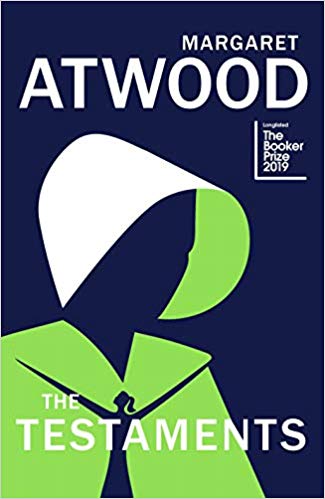
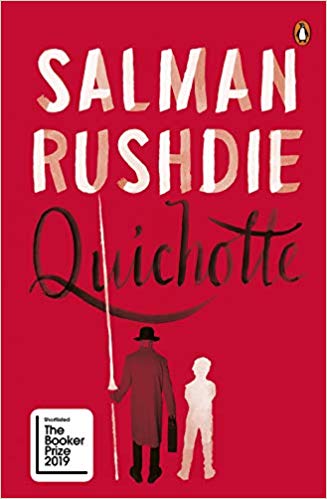
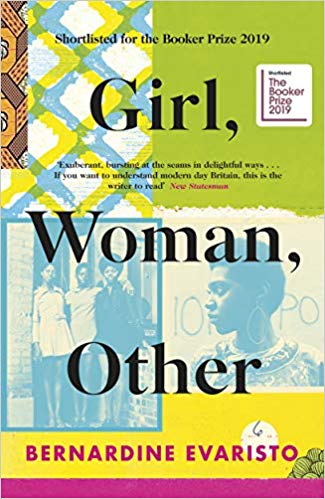
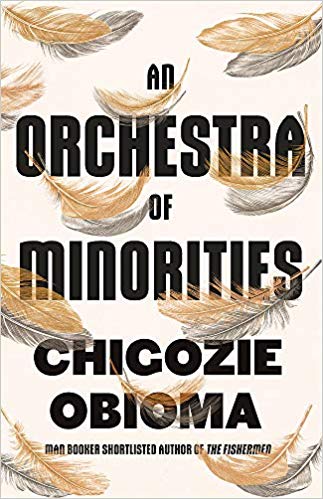
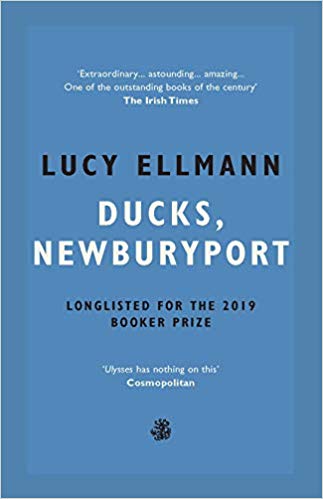
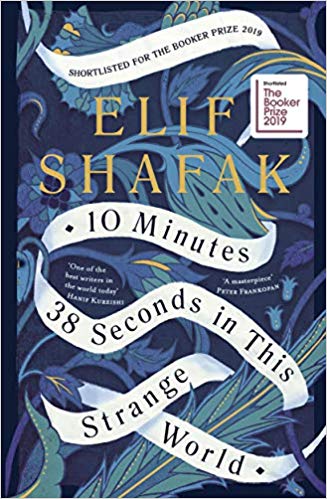
Zaynab122 nodded as a cloak of sadness engulfed her. Religion for her had always been a source of hope, resilience and love — a lift that carried her up from the basement of darkness into a spiritual light. It pained her that the same lift could just as easily take others all the way down. The teachings that warmed her heart and brought her close to all humanity, regardless of creed, colour or nationality, could be interpreted in such a way that they divided, confused and separated human beings, sowing seeds of enmity and bloodshed. If she were summoned by God one day, and had a chance to sit in His presence, she would love to ask Him just one simple question: ‘Why did you allow Yourself to be so widely misunderstood, my beautiful and merciful God?’
Elif Shafak’s latest novel 10 Minutes 38 Seconds In This Strange World is about a prostitute, Leyla Afife Kamile or Leila, who has been killed and her body dumped in the city waste bin. 10 Minutes 38 Seconds also alludes to the time it takes for the brain to remain active after a patient has been declared clinically dead. While the clock is ticking to the final 10 minutes 38 seconds, Leila in the dumpster, begins to recall her past — her childhood, her family and the group of five friends in Istanbul she considered her safety net — Sabotage Sinan, Nostalgia Nalan, Jameelah, Zaynab122 and Hollywood Humeyra. It is a motley bunch of folks in Leila’s inner circle consisting mostly of runaways like herself. They are on the fringes of society which gives them the freedom to move and comment easily. But for Leila five was a special number. It was a number found across all faiths. Five were the number of books in the Torah, Jesus suffered five fatal wounds, Islam had five pillars of faith, King David had killed Goliath with five pebbles, Buddhism has five paths while Shiva had five faces, looking out in five different directions and Chinese philosophy revolved around five elements — water, fire, wood, metal and earth.
In the patchwork of memories that Leila chooses to share with the reader there are instances of conversations between women in her village. There are conversations between the two wives of Leila’s father. There are conversations in the police station or waiting lines at the public hospital. There are conversations between clients and her pimp. Leila even reflects upon the sexual abuse she faced from her paternal uncle that the whole family chose not to acknowledge even though they, including her father, knew that Leila was telling the truth. There are the stories of her friends and their migration to Istanbul. Her friend the Somalian Jameela of mixed parentage ( Christian and Muslim) escaped ethnic cleansing and sexual exploitation who “like all foreigners, she carried with her the shadow of an elsewhere”. The other friends had similar stories. While these are stories that add up to create a fascinating narrative, what is truly remarkable is that Elif Shafak uses her literary skills to tell the stories of women and the marginalised. These are groups of people who are “normally” silenced in fiercely patriarchal societies. Using Leila to tell these stories is a magnificent literary device. For Leila’s voice is strong. It has an authoritative tone while sharing her story. It cannot be challenged for she is dead. Leila is free to share her experiences and opinions without any judgement being passed on her whatsoever. She is telling her story in the manner she likes. It is liberating. It also holds true for her friends who to some degree have the same freedom of expression as Leila as they are dismissed as “lunatics” by the coroner, so are not necessarily heard. They are free to express their opinions on even sensitive topics like religion. They are “devastated” with the loss of Leila but it is not something to be considered in the State’s opinion as they were not blood relatives. Instead the decision is taken to bury Leila in the loneliest graveyard in Istanbul — the Cemetery of the Companionless.
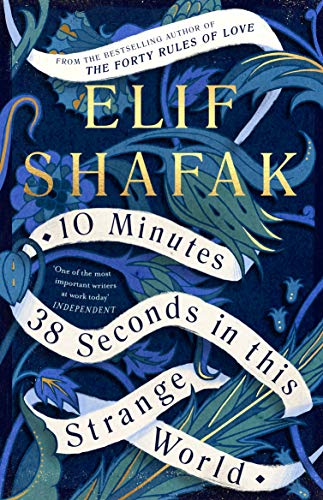
Elif Shafak said in the 2018 New Statesman / Goldsmiths Prize lecture “Why the novel matters in the age of anger” that in a world ruled by fear and division – novelists no longer have the luxury of being apolitical.
The novel matters because it connects us with the experiences of people we have never met, times we have never seen, places we have never visited. The novel matters not only because of the stories it brings alive, but also the silences it dares to explore. As novelists we keep our ears pricked all the time, attentive to the rhythm of the language, the usage of words, the stories and legends swirling in the air – but we must also listen carefully to the silences. Here we find the things that cannot be openly talked about in a society; the political, cultural, sexual taboos.
…
The novel matters because, like an alchemist, it turns empathy into resistance. It brings the periphery to the centre, it gives a voice to the voiceless, it makes the invisible visible. And it also distils the deluge of information into drops of wisdom – as argued by the German-Jewish philosopher and cultural theorist Walter Benjamin. Writing at a time when Nazism and the ideology of hatred were on the rise, and the world was turning upside down, Benjamin repeatedly made a distinction between “information” and “wisdom”. He believed that the writer, in the depth of solitude, shared his or her own experience or the experiences of others, and by doing this, shed light on “the perplexity of living”. But here is where Benjamin’s theory becomes all the more relevant for our world today. The more information is available and the faster it spreads, he thought, the deeper was the perplexity of living. The proliferation of information at the expense of wisdom, and the widening gap between the two preoccupied Benjamin. He was worried that this might bring along the demise, and eventually the death of the art of storytelling.
…
The job of a writer is to rehumanise those who have been dehumanised. As many who have lived through horrors have told us, including the Auschwitz survivor Elie Wiesel, the opposite of love, kindness or peace is not necessarily hatred and war. The opposite of love is numbness. It is indifference.
10 Minutes 38 Seconds In This Strange World exemplifies much of what she Elif Shafak said in her lecture. As a feminist she makes visible the domains of women and the marginalised by looking into their very souls. She makes the invisible stories visible and gives a voice to the voiceless. By dipping into the stories of her characters Shafak unveils the multi-culturally rich stories that exist all around us in a “comforting harmony”. These stories abound irrespective of the toxic politics of ultra-nationalism or religious fundamentalism or authoritarianism that are on the rise and with them misogyny and sexism. This is why she firmly believes that the age we are living in is an important crossroads for global solidarity, global sisterhood.
Read 10 Minutes 38 Seconds In This Strange World !
28 May 2019
...[it is a ] culturally awkward relationship between the voice of women and the public sphere of speech-making, debate and comment…the fact that women, even when they are not silenced, still have to pay a very high price for being heard, we need to recognise that it is a bit more complicated and that there is a long back-story.”
Mary Beard Women & Power: A Manifesto
On 26 December 2017, actress Priyanka Chopra delivered the annual Penguin Lecture — “Breaking the Glass Ceiling: 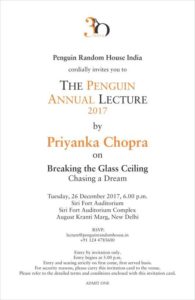 Chasing a Dream”. The invitation came with the following note:
Chasing a Dream”. The invitation came with the following note:
One of the most prestigious and eagerly awaited cultural events on the calendar, the Penguin Annual Lecture, hosted by Penguin Random House India, was started in 2007 as an initiative to bring leading writers, artists, thinkers and key personalities from India and across the world in direct contact with audiences and admirers in India. The first such event to be organized by a publishing house in India, the Penguin Annual Lecture is immensely popular with readers, book lovers, and the youth in particular. This will be the eleventh edition of the Penguin Annual. Lecture; over the past ten years, speakers have included thought leaders like His Holiness the Dalai Lama, Dr APJ Abdul Kalam, Professor Amartya Sen, Thomas Friedman, Amitabh Bachchan, Ramachandra Guha, and beloved authors from both India and abroad like Dan Brown, Jeff Kinney and Ruskin Bond. Through the Penguin Annual Lecture, Penguin Random House India aims to spread the thrill of fresh ideas to a new generation of readers, thinkers and future achievers.
The fact that this invitation to speak at a publisher’s annual lecture had been extended to a woman speaker for the first time, that too a popular Bollywood-transiting-into-Hollywood desi actress, caused a great deal of furore. ( Scroll and Feminism India ) Even feminist publishing house Zubaan Books released a series of tweets questioning the decision to invite Priyanka Chopra instead of the more established Indian women writers — referenced in the links provided. All had valid reasons for their objection.
Now hear Priyanka Chopra’s speech:
#Throwback to the time Priyanka Chopra delivered the #PenguinAnnualLecture and told us how to be fierce, fearless and flawed.
Posted by Penguin India on Wednesday, December 27, 2017
Unfortunately what irks a larger group of people is that Priyanka Chopra has no credentials as an author. Even when she was being introduced at the lecture there was no mention of her as an author though during the speech Priyanka Chopra fleetingly refers to herself as one. Many of the critics are disappointed that no woman writer was considered as is evident from the many names shared on social media. In fact on previous occasions some of the prominent male authors were flown in from different parts of the world to deliver the lecture. Surely such arrangements could have been made to locate an equally prominent woman speaker? Mary Beard, for instance, who is quoted at the beginning of this article, or PRH writers like Elif Shafak, a popular novelist and TED talk speaker — “Politics of Fiction” ( 2010) and “The revolutionary power of diverse thought” (2017). An extensive list of possible women writers — whether from India or abroad — can easily be drawn up from within the PRH stables itself!
Having said that the lecture borders on being motivational. Priyanka Chopra speaks well. She speaks forcefully and clearly. However she may couch the words, the fact is Priyanka Chopra is living her feminism by negotiating her spaces every single day. Years ago, when she was a relatively new to Bollywood, she gave an interview where she did not mince words about the fees she charged, the quality of her work and the fact she had to pay bills and needed to earn well to do so. It was refreshing to hear her say this. She continues to be frank and honest about her opinions. In a sense she is also representative of the second wave of feminists — the modern generation. Women of today who may not like to believe they are feminists as they do not necessarily practise it in the activist mould, and yet celebrate and believe these spaces are their birthright –ironically spaces which were made visible and won by many of the very same activists modern women shun. Yet they live it, imbibe it and continue to make choices which challenge boundaries — constantly. Priyanka Chopra symbolises this generation of women and is a fine role model for many. She also have the gift of being able to communicate as is evident from her interaction with the audience.
Penguin Random House India like many other publishing firms at this point of time are in the process of evolving, responding to new market forces, the alignment of the hyper-local publishing programme with the global scenario as in emergence of new business models. At the same time the brand identity of the firm has to be maintained and strengthened. This can only be done by reaching out to newer audiences that will in the long run ( hopefully!) convert to new readers as well. The fact remains Penguin Random House India with this event has ensured its brand recall has only became stronger irrespective of the animated conversations that have taken place in the past few days. It is a complicated space to be inhabiting today and for now, the celebrity publishing space has PRH India at its helm. This despite the actress’s biography by well-known film critic Aseem Chhabra is to be published by Rupa Publications in 2018.
Ultimately Penguin Random House India did well in their choice of speaker — it made good business sense!
Update ( 5 January 2018)
Writers Kiran Manral and Anil Menon have pointed out that in 2013 the superstar Amitabh Bachchan was invited to give the Penguin Annual Lecture. At the time there was little outrage as has been expressed now at inviting a Bollywood star to the event. Anil Menon adds “I don’t remember anyone complaining then, even after he pointed out in his discussion with Rajdeep Sardesai that ‘I would never have imagined 50 years ago that a publishing house would invite a film actor to speak’. The Penguin Annual Lecture is not a celebrity event. It is an event where someone who is famous for something other than just being famous is called to talk about books. That is a good thing.”
4 January 2018 
Updated on 7 Dec 2018
Mary Beard has released an updated version of her book Women and Power. The new edition has an afterword written after the #MeToo movement that unleashed a flood of testimonies or as she sees them, “self-empowering” narratives. Beard’s essay reflects when as a PhD student she was travelling in Italy for research and was towards the end of her stay when she was raped in a train. This happened over four decades ago.
****
“…in some respects, the Me Too movement fits my arguments in this book uncomfortably well. As I have tried to show, right back to Philomela ( who wove denunciation of her rapist into her tapsestry), women have often been allowed a limited voice, at least, in raising questions of their own treatment and abuse as women. #MeToo has made a gratifingly loud noise that, for once, has been transmitted over most of the planet, but it still falls into that general category. Even more to the point, the root cause of the harassment that women have suffered (and the root cause of the earlier silence of so many) surely lies in the structures of power. If so, then the only effective remedy lies in a change to those structures. While fewer than ten per cent of the directors of the top Hollwood films are women (that was the case in 2017), men will remain the gate-keepers of success in the film industry, and the effect of women’s voices on its sexual culture — however loudly those voices have now been raised — is likely to be limited.
****
Mary Beard will also be one of the speakers at the Jaipur Literature Festival 2019.
We were lucky to grab a few minutes yesterday with classicist, troll slayer, bestselling author & generally brilliant person @wmarybeard, who told us about the pb edition of #WomenandPower and its new chapter which addresses #MeToo. https://t.co/cRZQA81f2K pic.twitter.com/RE7nd1vxCd
— Profile Books (@ProfileBooks) December 6, 2018